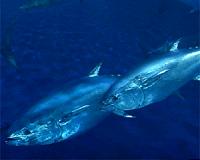| . |  |
. |
Brussels (AFP) Feb 22, 2010 Europe acted on Monday to bring about a worldwide ban on commercial fishing of bluefin tuna, the king of Japanese sushi and sashimi, in a move that has already angered Tokyo. However, the proposal unveiled by the European Commission, which has still to be agreed by national governments, is that any ban based on scientific evidence concerning falling stocks only comes into force in 2011. Brussels also wants to boost what it called "artisanal," or small-scale fishing, and both its environment and fisheries commissioners told a press conference that quotas could be re-allocated to boost jobs in coastal areas. Crucially, they will allow small boats -- as opposed to the super-trawlers employing dozens of crew that hoover up the majority of tuna caught in the Mediterranean -- to keep fishing and to supply the EU market with tuna. "Since there is a high risk that Atlantic bluefin tuna will soon be gone forever, we have no other choice than to act now and propose a ban on international trade," EU Environment Commissioner Janez Potocnik said. "Europe's goal must be to find an international solution that ensures a sustainable solution for both Atlantic bluefin tuna and the fisheries industry." Governments across the European Union must now approve the commission's proposal, ahead of a meeting in March in Qatar of the United Nations body that decides whether species are listed as endangered. "What really matters here is our intention, the future for fish and fisheries concerns every country," added EU fisheries commissioner Maria Damanki. "We are well aware of the short-term cost, but I am sure we can guarantee a viable future for our fishermen. "We have to try and persuade other Mediterranean countries of our intentions," she added. "An important part of the solution we are proposing today is a special arrangement for artisanal fishing vessels." The UN-backed wildlife trade agency supports a call to stop cross-border trade in the fish when 175 member nations to the Convention on International Trade in Endangered Species (CITES) meet in Doha. Marine wildlife experts say that, despite fishing quotas, bluefin tuna stocks have plunged by 80 percent in recent decades in the Western Atlantic and Mediterranean, threatening the predator species with extinction. Japan -- which consumes three-quarters of the global bluefin tuna catch from both the Atlantic and Pacific oceans -- says it opposes such a trade ban and prefers other mechanisms to make the catch more sustainable. Farm and Fisheries Minister Hirotaka Akamatsu said this month that Japan's answer to the proposed trade ban is "a clear no", and a fisheries official said Monday that Japan may "take a reservation" and ignore a ban if it is passed. "We have been saying that is one of our options," Shingo Ota, a senior negotiator for Japan fisheries, told AFP. "We are not saying we will definitely reserve it. We are doing our best so that it won't be adopted. Our final decision will come after the vote." France, the biggest producer of bluefin tuna for consumption, has spoken in favour of a ban, but for a limited duration and not for another 18 months. Italy has voluntarily introduced a one-year moratorium and is keeping its trawlers in port, using existing European Union funding to cushion the blow. But Spain, Greece, Cyprus and Malta have opposed such a ban.
Share This Article With Planet Earth
Related Links Water News - Science, Technology and Politics
 Brussels to propose bluefin tuna fishing ban
Brussels to propose bluefin tuna fishing banBrussels (AFP) Feb 18, 2010 Brussels will on Monday propose that the 27 EU governments ban commercial bluefin tuna fishing by classifying the species as being under threat of extinction, sources close to the dossier said. If the European Union backs the idea of reclassifying tuna, which is much in demand in Japan and elsewhere, then the bloc could take a united stance to the next meeting of the UN-backed wildlife trade ... read more |
|
| The content herein, unless otherwise known to be public domain, are Copyright 1995-2010 - SpaceDaily. AFP and UPI Wire Stories are copyright Agence France-Presse and United Press International. ESA Portal Reports are copyright European Space Agency. All NASA sourced material is public domain. Additional copyrights may apply in whole or part to other bona fide parties. Advertising does not imply endorsement,agreement or approval of any opinions, statements or information provided by SpaceDaily on any Web page published or hosted by SpaceDaily. Privacy Statement |